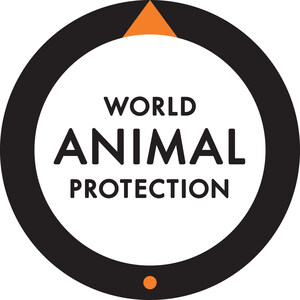New Report: 1/4 Billion Pounds of Pesticides in U.S. Are Applied to Crops Grown to Feed Animals on Cruel Factory Farms
Report Exposes Toxic Cost of Industrial Agriculture to Endangered Species
NEW YORK, Feb. 24, 2022 /PRNewswire/ -- Hundreds of millions of pounds of toxic pesticides used in the United States are applied to corn and soy crops grown to feed factory farmed animals, according to a new report, Collateral Damage, released today by World Animal Protection, US and the Center for Biological Diversity.
These toxins imperil thousands of already threatened or endangered birds, mammals, insects and amphibians, putting species and biodiversity at extreme risk.
A new webpage has been created to make this complex issue more easily understood. The webpage links to the full report as well.
An estimated 235 million or nearly ¼ billion pounds of herbicides and insecticides were applied to feed crops for factory-farmed animals in the United States in 2018, the most recent year for which complete information is available, according to the report's findings.
Collateral Damage reveals that consumers may be having a greater impact on the health of animals and the planet from their meat and dairy choices than they realize.
"It is critical that we understand the full environmental footprint of animal products so people can understand the true impacts of their food choices," said Cameron Harsh, programs director at World Animal Protection US. "Meat and dairy companies consume resources, such as feed crops and the land used to grow them, at unsustainable rates to create calorie-dense diets for the billions of farmed animals raised in the U.S. each year. Wild animals and ecosystems are paying the price."
Among the report's findings are the threats to protected species from the two most-used pesticides in this country — glyphosate and atrazine.
Glyphosate, roughly 100 million pounds of which was applied to feed crops in 2018, is likely to harm or kill 93% of plants and animals protected under the Endangered Species Act, according to federal regulators. Atrazine, the next most-applied chemical on U.S. feed crops, is banned in 35 countries and likely to harm or kill more than 1,000 protected species.
Expanding production of intensive corn and soy for farmed animal feed is also associated with converting native, biologically diverse grasslands to single-crop production and with polluting waterways, adding further threats to wild species.
"Endangered species like monarch butterflies, San Joaquin kit foxes and whooping cranes are threatened by these pesticides every day just to fuel the cruel and unsustainable factory farm industry," said Lori Ann Burd, environmental health director at the Center for Biological Diversity. "This is outrageous and should be a call to action for everyone who cares about animals."
World Animal Protection, US and the Center for Biological Diversity are calling on individuals and institutions to reduce their consumption of meat and dairy, opting for diets and menus that prioritize plant-based foods to lower impact on animals and the planet. Those interested in strategies for shifting their food choices can look to World Animal Protection's Meating Halfway journey for resources.
World Animal Protection
World Animal Protection has moved the world to protect animals for more than 55 years. With offices in 13 countries, World Animal Protection works to give animals a better life. The organization's activities include working with companies to ensure high standards of welfare for the animals in their care; working with governments and other stakeholders to prevent wild animals being cruelly traded, trapped or killed; and working for the better treatment of farmed animals.
World Animal Protection influences decisionmakers to put animal welfare on the global agenda and inspires people to change animals' lives for the better. More information on World Animal Protection can be found at: http://www.worldanimalprotection.us/
The Center for Biological Diversity is a national, nonprofit conservation organization with more than 1.7 million members and online activists dedicated to the protection of endangered species and wild places.
SOURCE World Animal Protection

WANT YOUR COMPANY'S NEWS FEATURED ON PRNEWSWIRE.COM?
Newsrooms &
Influencers
Digital Media
Outlets
Journalists
Opted In





Share this article